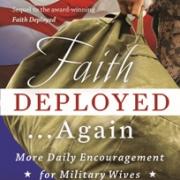Book Club Day 11: Taking Every Thought Captive
[[{"type":"media", "view_mode":"media_large", "fid":"1093", "attributes":{"class":"media-image alignleft size-full wp-image-2413", "typeof":"foaf:Image", "style":"", "width":"284", "height":"423", "alt":"black-woman-and-Bible"}}]]Welcome to the Faith Deployed...Again online book club, Day 11! (Not sure what this is all about? Click here.)
In Your Book: Before we begin, please turn in your copy of Faith Deployed...Again to page 146 and read "Placing Our Identities in Christ" by Jill Hart. (If you don't have a book, don't go away! We'd love to have you join us for this discussion anyway!) Now Let's Talk: Today's discussion is led by Jill Hart. In "Placing Our Identities in Christ," I give two suggestions for how we can daily live as children of God, keeping in mind that our "identity rests not in what you do, or what ID badge you carry in your purse, but it's found in Christ and the sacrifice He made for our sins." The suggestions I gave were:
1. Know what the Bible says. Reading from God's Word each day is a graet way to learn more about our Creator and our identity as God's child. 2. Take captive every thought. When those negative thoughts begin popping up ("God could never love you," "You're no good,") stop them in their tracks. Recite one of the verses above and remind yourself that it's what God says that matters.
Today I want to explore this concept of taking every thought captive. This phrase comes from 2 Corinthians 10:5, which says: "We demolish arguments and every pretension that sets itself up against the knowledge of God, and we take captive every thought to make it obedient to Christ." So what does that really mean? It means make sure that what you're thinking lines up with biblical truth. Now let's look at what this means on a practical level. Do you ever catch yourself being critical … of yourself? Most of us strive to be kind to others – to follow the “Golden Rule.” We know that our mother’s admonishment of “If you can’t say anything nice, don’t say anything at all” applies to what we say to those around us. But, when it comes to ourselves we are our own harshest critic. We also have an enemy that is skilled at finding our weakest points and whispering those things to us repeatedly.
“God could never really love you.”
“You’re not good enough.”
“You should avoid disappointment and just quit now.”
We wrestle through our days trying to work despite these debilitating thoughts. We trudge through life living as if these statements were true. But they are not true. In fact, God’s Word tells us the opposite:
We cannot be separated from the love of God (Romans 8:31-39)
We are free from condemnation (Romans 8:1-2)
We can be confident that God will complete the good work He started in me (Philippians 3:20)
I get caught in this trap over and over. And over and over I go and sit at the feet of Jesus and ask Him to fill me with His truth once again. And He does. Every time. When those negative thoughts begin sprouting in your mind, stop them in their tracks with the Word of God. Recite one of the verses above. Take confidence in the fact that it’s what God says that matters. Discuss: What are the most common thoughts you need to "take captive" in your own mind? What Scripture verses are your favorites to refute the lies Satan would have you believe?










